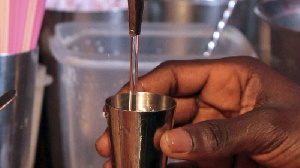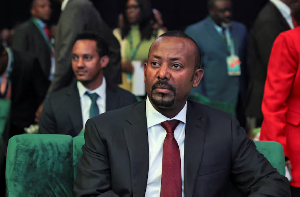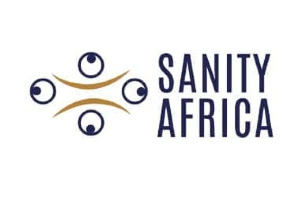Chiefs in the Upper East region have proposed a total ban on sales and consumption of “akpeteshie”, an alcoholic spirit locally brewed in Ghana and other West African countries.
The proposal, for development watchers, is long overdue for a region where commercial drinking spots are on the verge of outnumbering signboards on street corners to meet insatiable demands.
Consumption of the liquor, considered since pre-colonial times as another alarming form of drug and substance abuse, has steadily consumed not only the health of countless youths everywhere but also their potentials and careers.
Organisations and individuals, including traditional authorities, have waxed worried progressively more about the far-reaching dangers associated with the substance on society and have waged open campaigns over the years against its sales. But this is, perhaps, the first time chiefs in the region have come together in a clear chorus for a total ban on it.
They came up with the proposal when the region assembled in Bolgatanga, the regional capital, at the weekend to mark the International Day against Drug Abuse and Illicit Trafficking.
“Young people who begin drinking before age 15, according to researchers, are four times more likely to develop alcohol dependence than those who begin at 21. I am told by prisons authorities that today there is a sizeable number of our youth languishing in our prisons and the psychiatric hospitals due to the use of drugs. Armed robbery is clearly on the ascendancy with its accompanying violence and crime in our villages, towns and cities.
“A closer look at the emerging problem shows the proliferation of so many illicit and dangerous drugs in our schools, homes and on the black market. There is no doubt that if measures are not put in place to stop this menace, the nation will ultimately be the loser. In the light of the above, we the chiefs of the region want a total ban on sales and consumption of alcohol in the region,” the Paramount Chief of the Builsa Traditional Area, Nab Azagsuk Azantilow, told a crowd of government officials, heads of state institutions and schoolchildren who assembled at the Golden Jubilee Park to celebrate the day.
Neglected kids take cover in drugs
Because children who suffer childhood neglect mostly struggle against addiction to illicit drugs later in life, speakers at the event placed emphasis on the need for parents not just to take care of their children but also to make friends with them.
This, they stated, would offer them the insight and the early intervention needed to keep their children on track against bad influence.
“For us to win the fight against alcoholism and drug abuse among the youth, parents must be friends with their children. Some experts have indicated that parents who ‘listen first’ to their children know where the children are when they will return and have strong relationships with them. Such children are five times less likely to abuse drugs and alcohol in their lives,” the Upper East Regional Minister, Albert Abongo, who was the special guest of honour at the event, advised.
He added: “It is a fact that the earlier children begin to use drugs, the earlier they develop drug dependence later in life. I want to use this medium to appeal to parents, guardians and opinion leaders to provide adequate care and attention for children in our communities to discourage them from engaging in drug abuse and alcohol use. Let us come together and save our future leaders from drug abuse and illicit drug trafficking.”
The Drug War
Abuse of drugs, particularly the consumption of alcohol, has eaten the region’s socio-cultural fibre so deep there is a general feeling it is only possible to wage war against it but impossible to win it.
A number of individuals and organisations who are at open war against the abuse in the region received a pat on their backs from the Regional Minister for their efforts. These include Life Out of Alcohol and Drugs Ghana (LOAD Ghana), Basic Needs Ghana and the Paramount Chief of the Builsa Traditional Area.
But the Regional Minister, whilst showering praises on the anti-drug crusaders, also observed at the event that “in spite of these efforts, alcoholism and drug addiction is still prevalent in the Upper East Region”.
Notwithstanding how difficult the war seems, the Executive Director of LOAD Ghana, Roger Abaa Atambire, who himself is a recovering alcoholic and so far has toured about 25 schools through his anti-alcohol campaign outreach programme in the region, told the crowd the region could become a drug-free society.
“I believe that if all of us come together as a people to fight drugs and alcohol in this country or in this region, we would emerge victoriously. The drug war is won through education. We need to start education very early in the primary and junior high schools. We should not wait for Central Government to come to our aid. If we don’t start fighting this war to a lintel level before asking for support, they would think we are not serious,” Roger Abaa Atambire emphasised in a speech almost climaxed with tears as he gave way for the next speaker.
Alcohol, a sneaky devil
Hundreds of schoolchildren took part in the event, each one carrying a placard. The inscriptions on some of the placards read: “Drugs affect more than just you”; “Drugs destroy and ruin millions of lives every year”; “Drugs may be the road to nowhere”; “Best form of prevention is avoidance”; “Substance abuse impairs judgement”; “If you do cocaine, you will go insane”; and “The more you use, the less you live”.
Behind the dais where the dignitaries sat was a large banner, bearing the theme for the event in bold letters: “Listen First: Drug Prevention among the Youth and Children.”
A member of the Council of State and guest speaker for the celebration, David Adeenze-Kangah, warned the schoolchildren against the lure of alcoholism and drug abuse.
“Alcohol is a sneaky devil. There is a certain bird in the forest. When you see that bird, it would jump and just land very close to you. It doesn’t go far. Then, when you see it, you would say oh, if I just race a bit I will catch it. When you are getting close to it, it would take off again and land very close by; it won’t go far. You can follow it; it would be doing the same thing; you would be following it; before you realise, you are in the middle of the forest and you may not be able to tell your way out,” Mr. Adeenze-Kangah said.
He explained: “That is how alcohol behaves. You take small; you are fine; nothing happens. You take small; you are fine. Then, there is a day when you take and, then, you go home. Your own mother, the person who brought you up, says something and you beat her up. When the alcohol has gone and people tell you that you beat up your mother, then, you start crying: 'How can I beat my mother?' Alcohol never satisfies. By the time you are satisfied with alcohol, you don’t even know where you are.”
Mr. Adeenze-Kangah’s speech lasted 32 minutes in a language so simple and well expressed that an impressed crowd came close to showering money on him in what would have been the first time a speaker had received such acclaim at a social event in the region. And through it, all, both the schoolchildren and the grownups followed his presentation with their undivided attention, in a spectacle much like a fairytale in the moonlight told by a grandfather to his grandchildren by the fireside in the countryside.
Regional News of Tuesday, 28 June 2016
Source: starrfmonline.com













